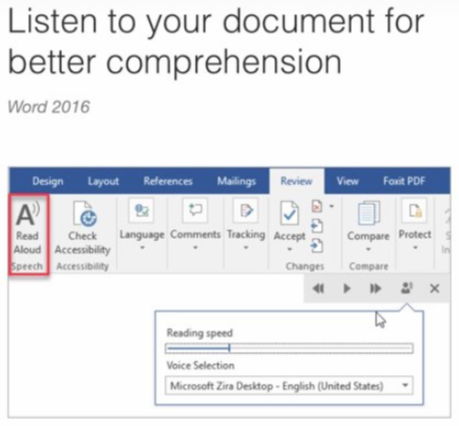The Harris County Law Library’s Legal Tech Institute is pleased to announce a special visitor, D. Casey Flaherty, a recognized leader in legal tech innovation and the creator of the Procertas legal tech audit. Please join us on Monday, August 19 and 11:00 am for a CLE presentation called Legal Tech is not optional. Mr. Flaherty will share his insights about using technology in the practice of law and will highlight how the Procertas Legal Tech Assessment, which is available to all for free at the Harris County Law Library, can help attorneys work toward legal tech competence. Texas attorneys will earn one hour of CLE credit and .5 hours of ethics credit for attending. Join us!
Text-to-Speech Options
In order to better serve our visually impaired patrons, we at the Harris County Law Library recently explored our options for providing text-to-speech services. We were happy to discover three free tools: Otter, TTS Reader, and Microsoft Word. Each is described below.
Otter: Otter is more than just a text-to-speech application. Also included are a dictation feature and automatic, real-time transcription. The app and the basic plan, which offers 600 minutes of dictation per month, are free.
TTS Reader: Text To Speech Reader converts any text to spoken language. TTS will read your text in a natural voice. Choices include UK and US English in a male or female voice, in a range of reading speeds from Very Slow to Too Fast. Drag and drop files or paste content into the provided text box. TTS Reader will read aloud for you in whichever voice you select and at whichever speech you prefer.
Microsoft Word: The newest versions of MS Office (2016, 2019, and Office 365) include a Read Aloud feature, allowing you to listen to your document for better comprehension. Words will be highlighted simultaneously as they are being read. To use this feature, simply open Word, click Review tab > Read Aloud, or press Alt+Ctrl+Space on your keyboard. Click Play/Pause to start and stop the narration. Select Settings to change the reading speed.
If you are using MS Office 2013, there is another option for accessing the text-to-speech conversion feature. Follow the steps outlined here (and see image below) to turn this feature on in Word 2013.
Open Word
Click the “Customize Quick Access Toolbar” button which is located at the very top of your window above the Tabs (File, Home, Insert, Design, Layout, etc.) Select “More Commands”
On the “Choose Commands From:” dropdown menu, select “Commands Not in the Ribbon”
Scroll down to the “Speak” option, then click Add. Click Add when you are finished.
Now, highlight the text to be read aloud. Click the Speak Button, which looks like a small speech bubble, on the Quick Access Toolbar. Word will read your text. It’s that easy!
The 2019 Solo and Small Firm Legal Technology Guide
The American Bar Association’s annual guide to legal technology has arrived here at the Law Library. Newly updated, The 2019 Solo and Small Firm Legal Technology Guide is the guide to assist solo and small firm attorneys navigate the world of legal tech. The Guide offers information and recommendations to help attorneys find the technological equipment that will give them the most bang for their buck. From hardware to software to smartphones and anything else in between, the Guide takes the guesswork out of purchasing the computer equipment that is most appropriate for your office and business. Updated topics include:
new hardware and software recommendations;
best products to protect sensitive data;
tips for secure remote access to data;
suggestions to help you prepare for the unexpected and unthinkable, such as data breaches, lost smartphones, natural disasters; and
a roundup of tomorrow’s legal technology trends.
Intrigued? Come to the Harris County Law Library and ask for The 2019 Solo and Small Firm Legal Technology Guide at the reference desk. It can be found in our Legal Tech Collection.
Introducing the Digital Education Nook!
Harris County Law Library’s newest learning opportunity brings on-demand video content to all within steps of the Harris County courthouses in downtown Houston.
A Digital Content Access Point for Everyone
The Digital Access Nook is an access point for digital collections from the Law Library’s Legal Tech Institute, the Harris County Attorney’s Office, and the Texas Office of Court Administration. Content covers a variety of topics, from self-help videos to help you work with your attorney or represent yourself in court, to legal technology videos on cloud computing and artificial intelligence. Bring your headphone or use ours and immerse yourself in one of more than 40 videos focused on legal topics. With a variety of content in a fully accessible space, there is something for everyone in the Digital Education Nook!
Google, Privacy, and You
The subject of a recent opinion piece in the New York Times discusses the “privacy paradox,” a sort of cognitive dissonance that compels us to share information about ourselves on every available platform while simultaneously cursing the technology that makes our compulsive sharing habits so addictive. That paradox can have wide-ranging implications for the legal community, which now has an ethical obligation to “remain competent in the practice of law, including the benefits and risks associated with relevant technology.” The ubiquity of Google makes it necessary for lawyers to understand the impact it can have on the clients being served. For example, when Google periodically pings your device to track your location even when your device-location feature is turned off , it might implicate jurisdictionally-specific privacy rights or contract law, as a recent investigation by the attorney general of Arizona suggests.
Mapping a device’s location is only one tracking method commonly employed by prominent tech companies. Google tracks you in all sorts of ways through apps, it’s Chrome browser, and more. The information is used to facilitate marketing efforts, including sales to third-party marketing firms, and to integrate your online experience. A recent New York Times op-ed by Google’s CEO provides the company’s view on protecting data privacy while using the data collected to create a more customized economy. At its annual developer conference just weeks ago, Google reinforced its commitment to privacy with the launch of two new efforts — better cookie controls and guards against fingerprinting. Additional trust-building measures are likely in the works (including security features in the redesign of Gmail), especially as increasing numbers of users defect from Google to alternative browsers like Brave and Vivaldi.
The takeaway for legal professionals: Follow news about Google and keep reminding clients who find themselves in a privacy paradox about how information is used in the information economy.













